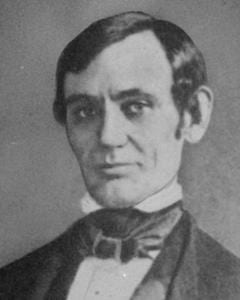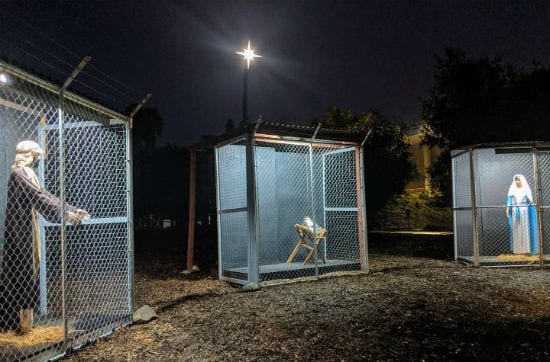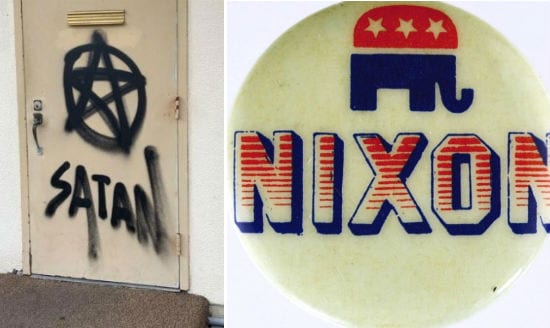The Washington Post's Dana Milbank has the best article I've seen on the meaning and the ramifications of President Bush's surprise Thanksgiving visit to an airport outside of Baghdad.
… it is too soon to know whether the image of Bush in his Army jacket yesterday will become a symbol of strong leadership or a symbol of unwarranted bravado.
Iraqis may be reassured that the United States will put down the insurgency and restore order in their country. Or they may take the image of Bush landing unannounced at night without lights and not venturing from a heavily fortified military installation as confirmation that the security situation in Iraq is dire indeed.
But one thing is certain. Bush's Thanksgiving Day surprise ties him, for better or worse, ever more tightly to the outcome of the Iraq struggle.
Tying Bush's political future "tightly to the outcome of the Iraq struggle" has been precisely the goal of critics of the Bush administration's policy in post-invasion Iraq. (Or, more precisely, critics of Bush's lack of any discernible consistent policy.)
His visit to Iraq yesterday accepted the terms, if not the substance, of those critics. For better or worse, as Milbank says, George W. Bush's presidency, his political future and his place in history are inextricably bound up with the long-term outcome of the invasion of Iraq.
If that nation develops into the beacon of secular democracy and stability that Bush has promised it will become, then voters and history will forgive even his creation of staggering, structural, long-term deficits. If Iraq continues spiraling into an Afghan-style chaos, then crippling debt and environmental regression will be remembered as mere footnotes to Bush's hubristic diminishing of a once-mighty superpower.
It's a high-stakes gambit, as Rich Bond, a former head of the GOP, describes it in a poker metaphor:
"It raises the stakes … When you're playing poker and somebody is coming at you, a great way to deter them is to raise the stakes. George Bush just placed his stature in an extraordinary way to reassert his commitment to Iraq."
I agree with Chris Lehane, who spoke yesterday on behalf of Ret. Gen. Wesley Clark:
"It's absolutely appropriate to be honoring our soldiers overseas in battle on a day like Thanksgiving … It's more important to honor them every day, which includes allowing us to appropriately honor the heroes who come back in caskets and giving our troops a strategy so they're not there next Thanksgiving."
And also with Sid Blumenthal, who said:
"The message to the Iraqis is Bush doesn't think their country is secure … It underscores the insecurity, and it conveys insularity.
I was also glad to see that Bush apparently made this trip without bringing along the five White House chefs who have accompanied him on his previous high-profile travels. Five chefs for a 2 1/2 hour visit may have seemed like overkill even by the extravagant standards of this president.
The president's remarks were mostly unremarkable. The "just looking for a warm meal" line was pretty good — if a bit rehearsed.
I was amazed, though, to hear he repeated his stock phrase about "defeating the terrorists here in Iraq so we don't have to face them in our own country" before this particular audience. The troops are in a position to know first-hand what President Bush himself knows — this piece of rhetoric is a steaming crock.
Matt Labash dismantles this tired bit of foolishness in the conservative Weekly Standard, in an article that went online at about the same time as Bush was repeating the phrase yet again. Labash piles on some withering mockery, then reminds us to keep two things in mind when we hear this cliche:
The first, is that we're not altogether sure we are fighting terrorists, in the al-Qaeda sense of the word. As Newsweek recently reported in a piece entitled "War In the Dark," "what the Americans don't know is who, exactly, they're fighting." In a week in which four suicide-bombing attacks in Baghdad killed more than 30 people, one general told reporters "that the attacks were the work of 'foreign fighters.' Yet just 24 hours earlier his division commander … told a news conference that he had not seen 'any infusion of foreign fighters in Baghdad.'" A recent Washington Post story reported that at one Baghdad briefing, the commander of the 82nd Airborne Division, in the dark himself as to the identity of the guerillas, said that 90 percent of the fighters the U.S. had killed or captured were Hussein loyalists or Iraqi religious militants–and only 10 percent were freelancers from abroad. Meaning that, according to his calculations, there's a decent chance that if we weren't fighting these particular terrorists in Babylon, we wouldn't be fighting them in Bakersfield.
The second thing to remember, for most of the people declaring where they'd rather fight the terrorists, is that they are not personally doing much of the fighting. …












